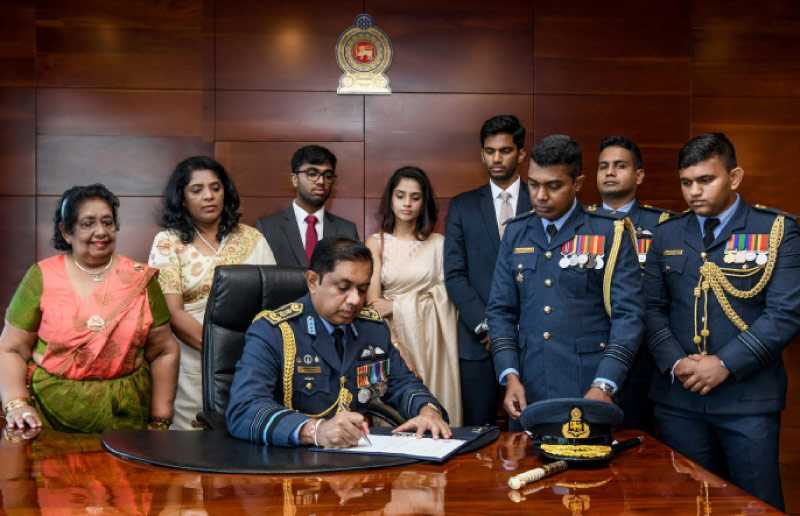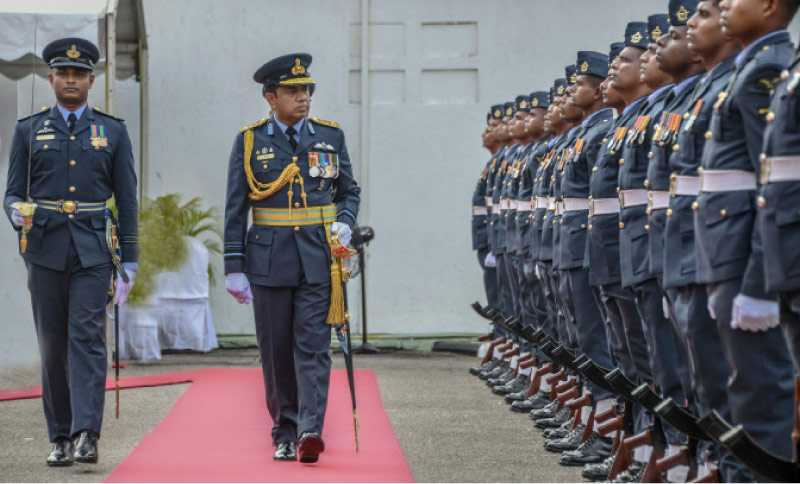Thursday Feb 19, 2026
Thursday Feb 19, 2026
Thursday, 5 November 2020 02:20 - - {{hitsCtrl.values.hits}}


Air Marshall Sudarshana Pathirana is the 18th Commander of the Sri Lanka Air Force
By Asiri Fernando
Maintaining airpower, expanding maritime surveillance and rescue capabilities are key objectives for the Sri Lanka Air Force (SLAF), Air Marshall Sudarshana Pathirana said, having taken command of the force on Tuesday.
Addressing a press conference Air Marshall Sudarshana Pathirana, stressed the importance of maintaining the airpower capability that is expected from the SLAF as key objective.
The Air Force Commander also stated that the SLAF was engaged in domestic aviation operations at the request of the Government with the aim of assisting tourism, pointing out that if private aviation organisations deployed larger aircrafts and grew in scope and capabilities, the Air Force would move out of the domestic aviation market.
Given the current economic environment the SLAF will look to maintaining and overhauling the existing fleet of aircrafts to meet the national security needs of the country than pursuing costly acquisitions programs, Pathirana explained. Nevertheless, 18th Commander of the SLAF stated that some new platforms may need to be purchased to expand the long-felt gap in Maritime Surveillance and Search and Rescue (SAR) capability.
“Sri Lanka has a Search and Rescue region which is nearly 60 times the land area of the island and we need to be aware of what is going on in it and be able to respond to any situation in that maritime domain. We need some new platforms to fill the gaps,” Pathirana said. The SLAF stood up number three Maritime Squadron after nearly two decades in January last year with the aim of expanding Sri Lanka’s air-maritime operations.
The recent incident offshore with the crude oil tanker MT New Diamond also highlights the need to bridge the gaps in maritime surveillance, fisheries monitoring, pollution control and SAR, the Air Force Commander told the Daily FT.
“If we take the fighter – attack capability – we are well below the required standards. We don’t have an enemy to go attack but we need to be ready, we need to maintain the capabilities and capacity we had in the past. We have already invested in the platforms and we have experienced pilots and we need to keep that force intact. If we don’t use them or upgrade them, we are actually wasting money,” AM Pathirana stated, commenting of the current fleet.
Pathirana opined that the transport fleet of aircrafts and helicopters need maintenance and overhaul to keep them serviceable and operationally available. “Flying is a costly affair. We have to keep the current situation in the country and the world in mind, we are currently planning our approach and I will only ask the Government for what is necessary,” he said in response to a question.
The Air Force commander stated that United Nation Peacekeeper mission may have a requirement for attack helicopters in the future, pointing out that the SLAF already has two Helicopter Units operating in Africa on UN missions.
“We need to maintain our tactical and operational capability of the squadrons and maintain the capability of the platforms airworthy, otherwise the platforms will go to waste,” he stressed.
The SLAF is keenly pursuing an indigenous Unmanned Air Vehicle (UAV) system and aims to bring more UAV platforms in to service in the coming years and will also studying the evolving challenges pose to Sri Lanka from non-state actors in order to face them effectively, Pathirana told the press. One area of significant concern is Cyber Security and the SLAF is leading the National Cyber Security and Cyber Defence initiatives, he added.
Pathirana said that the acquisition cost of UAV’s had significantly reduced due to the proliferation of the technologies involved and said that unmanned platforms offer wide ranging surveillance and monitoring application needed for task such as SAR, counter narcotic operations, flood response, monitoring deforestation and sand mining.
AM Pathirana also pointed out that due to the increasing frequency of natural and man-made disasters in the Island and in the region, the SLAF is preparing to provide a range of services in the Humanitarian Assistance and Disaster Response (HADR) field. The SLAF is has also stationed specialist and helicopters to be used as Air Ambulances for high risk COVID-19 patient transfers, if the need arises.
